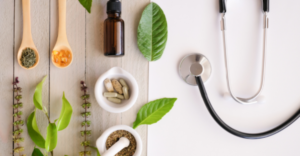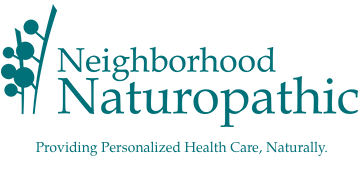We field many questions from patients related to endometriosis and how a naturopathic approach to treatment can work in cooperation with a western approach.
Read on to learn how Dr. Margaret Litchy-Miller responds to Neighborhood Naturopathic’s most frequently asked questions about endometriosis:
Why do I have endometriosis? What is the cause? And why does it affect me?
This is the million-dollar question that experts do not have the answer to yet, as evidence-based research is still quite limited. However, we do have a pretty good idea what it could be, including (but not limited to) genetic factors or family history, estrogen excess/dominance, environmental toxins, and immune system dysfunction. I should mention most endometriosis patients will be experiencing/living with multiple contributing factors to their condition (for example, they will have a family history of endometriosis and have estrogen dominance).
In my clinical experience, almost all endometriosis patients are experiencing some kind of estrogen excess in their body. This is relevant because estrogen is a “growth” hormone. It is the reason women grow breasts, hips, and the reason why the uterus grows an endometrial lining to support a potential pregnancy. So, it makes sense that if your body is producing too much estrogen (mainly estrodiol), or not getting rid of the estrogen you are making, it could contribute to endometrial tissue growth. Many patients also have a h3 family history of endometriosis.
What does inflammation have to do with endometriosis? My doctor did not touch on this topic.
Actually, inflammation has everything to do with endometriosis! The condition of endometriosis is defined as an inflammatory condition in which endometrial-like tissue is found in other places in the body besides the uterus (where it normally exists). The most common places include the ovaries, the bowel, or tissue lining the pelvis. Although it is less common, tissue can spread beyond the pelvic region to areas including, but not limited to, the appendix, diaphragm, and lungs.
Inflammation in body can result from multiple factors including immune system overstimulation (illness), eating too much fast food, not getting enough sleep, or too much stress at work. If you are a science nerd like I am, you may find it interesting that inflammation caused by all of that Chinese take-out, extra glass of wine at night, and late-night Netflix binging is altering the function of immune cells like T cells, macrophages and NK cells. Now, these cells are creating (even more) pro-inflammatory mediators that promote adhesion and proliferation of endometrial tissue. Not only that, this added inflammation is also going to alter sex steroid receptor expression and increase aromatase activity (in other words, it will further increase your estrogen levels and ability to act on tissues).
How does eating affect my hormones? Is there something I can do to make it better or worse?
What you eat can (and will!) effect your hormones in many different ways. For example, eating foods rich in a substance called phystoestrogens has been shown to help reduce symptoms associated with menopause by supporting estrogen levels that decline during this time. Another example is eating foods rich in simple carbohydrates (I’m looking at you Starbucks blueberry muffin and Grande mocha!) produce a spike in the hormone known as insulin, potentially contributing to conditions such as prediabetes and insulin resistance.
Here’s the deal; most women I work with eat in manner that produces way more inflammation, blood sugar dysregulation, and irregularity than they are aware of. Skipping meals, regular Starbucks runs, skimping on protein, forgetting the fruits and veggies…these are all habits many of my patients have. Unfortunately, all this does is create more inflammation! Which endometriosis thrives on. Not only that, but a diet that lacks fiber through fruits and veggies can contribute to constipation. If you are not pooping every day (yes, every day), that means you are not ideally pooping out your estrogen. If you aren’t ideally pooping out your estrogen, then you are giving it the opportunity to be reabsorbed through the colon, reenter the blood stream, and contribute to building more endometrial tissue where it shouldn’t be built.
In terms of pain management, what options are out there other than the traditional pain killers my doctor prescribed?
There are numerous options for pain management outside of traditional pain killers! While it may take some trial and error to determine what is most effective for each individual, a combination of naturopathic modalities can often be just as effective, if not more, than traditional pain killers for endometriosis. Some of the modalities I will often recommend to patients include botanical medicine, hydrotherapy, homeopathy, and nutrient therapy.
One of my favorite products that has been successful in helping endometriosis patients with their pain is EstroBal. I particularly like it because:
- it combines botanical medicine with nutrient therapy
- it acts on multiple detoxification pathways in the body to lower inflammatory estrogen levels quickly
What are natural ways to help remedy my endometriosis? My doctor gave me the following options: surgery, birth control, or forced menopause?
For some women living with endometriosis, surgery, birth control, or forced menopause may be necessary in order for them to live daily life. However, many women who get to this point were never made aware of the things they could have done to prevent them from getting there in the first place.
Birth control and forced menopause are effective treatments for endometriosis because they suppress hormone production by either:
- Disrupting communication between the brain and the ovaries
- Surgically removing the ovaries.
However, eliminating or suppressing estrogen before menopause can have its own medical consequences (think early osteopenia, low libido, vaginal dryness, etc.)
If you are suffering from the symptoms of endometriosis, one of the first steps I discuss with patients is taking a DUTCH test to thoroughly evaluate their hormones.
This is much more valuable than traditional serum hormone evaluation because it evaluates specific biochemical pathways of hormone breakdown and detoxification processes, which allows my patients and I to create a precise, effective, and individualized treatment plans unique to them. Schedule time with Dr. Litchy-Miller to learn more about a naturopathic approach to endometriosis.
If you are interested in learning more ways that naturopathic medicine supports health and wellness in your life, sign up for our monthly newsletter where we give insider tips and tricks about living well.

